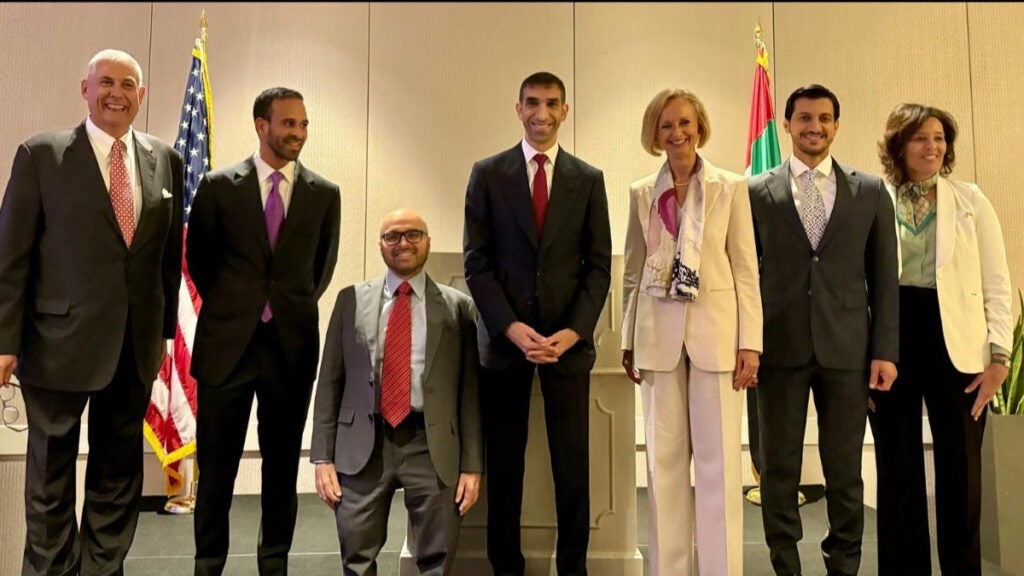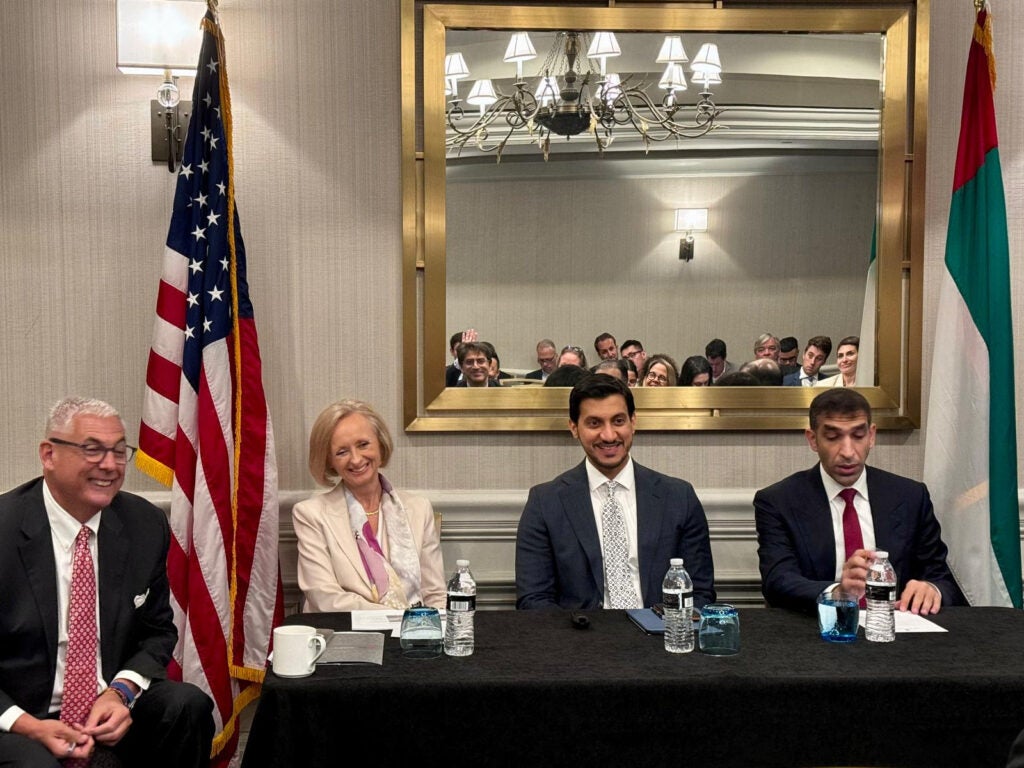
The U.S.-U.A.E. Business Council hosted a reception in honor of H.E. Dr. Thani Al Zeyoudi, U.A.E. Minister of State for Foreign Trade, and the U.A.E. delegation attending SelectUSA on Monday 24 June at the Ritz-Carlton Hotel in Washington, D.C. H.E. Dr. Al Zeyoudi is leading the U.A.E.’s delegation to the SelectUSA Investment Summit 2024 organized by the U.S. Department of Commerce and being held in Washington, D.C. from 23-26 June 2024. Minister Al Zeyoudi, as well as U.S. Ambassador to the U.A.E. Martina Strong and H.E. Mohamed Al Hawei, Undersecretary of the U.A.E. Ministry of Investment, gave remarks at the reception. A working group discussion with H.E. Juma Al Kait, Assistant Secretary for International Trade Affairs, on the U.A.E.’s comprehensive economic partnership agreements (CEPAs) preceded the reception.
U.S.-U.A.E. Business Council President Danny Sebright welcomed the U.A.E.’s SelectUSA delegation and highlighted the important role the U.A.E. has played over the years as a strong contributor to the U.S. economy. He congratulated the U.A.E. for being ranked the second-largest market after the United States for greenfield foreign direct investment in 2023, and showcased artificial intelligence (AI), technology, life sciences, healthcare, space, and clean energy as key sectors that offer numerous opportunities for U.S. companies to partner with the U.A.E.
In her welcome remarks, U.S. Ambassador to the U.A.E. Martina Strong praised the dynamic U.S.-U.A.E. commercial relationship and encouraged U.S. companies with a presence in the U.A.E. to explore opportunities under the CEPAs. She welcomed the over 60 members of the U.A.E. delegation to SelectUSA and remarked that platforms such as SelectUSA facilitate economic development and job creation. Echoing Mr. Sebright’s opening remarks, Ambassador Strong highlighted AI, advanced technology, space, and life sciences as sectors that offer tremendous opportunities for U.S.-U.A.E. commercial collaboration. Ambassador Strong stated that the lack of a free trade agreement or CEPA between the U.A.E. and U.S. does not hinder commercial activity and cited the close collaboration between the two countries in key sectors.
H.E. Dr. Al Zeyoudi outlined the U.A.E.’s vision to double the size of its economy by 2030 and diversify exports. He mentioned that the 17 CEPAs the U.A.E. has signed with various countries, and the many more CEPAs in negotiation, are core components of this vision because they offer increased access to foreign markets for export of goods and services, facilitating long-term partnerships for private sector investment. H.E. Al Zeyoudi lauded the strength of the bilateral relationship, remarking that bilateral trade jumped to over $31 billion in 2023, making the U.A.E. the largest destination for U.S. exports in the Middle East and North Africa region for the 15th year in a row. He cited Microsoft’s $1.5 billion investment in G42 and Masdar’s renewable energy projects in the United States as signs of growing momentum in critical sectors of the bilateral commercial relationship.
H.E. Al Zeyoudi praised the vision of U.A.E. leaders which has transformed the U.A.E. economy into a diversified marketplace that is less reliant on the oil and gas sector. He underscored that foreign trade development features prominently in the U.A.E.’s broader economic strategy, with local manufacturing, talent development, and growing service exports playing important roles in the U.A.E.’s CEPA agenda.
H.E. Mohamed Al Hawei, Undersecretary of the U.A.E. Ministry of Investment, mentioned the mandate of the newly established ministry to attract foreign direct investment (FDI) into the U.A.E. and support U.A.E. companies abroad. H.E. Al Hawei noted that foreign companies operating in the U.A.E. potentially have market access to over 2 billion people due to the CEPAs. He offered the Ministry’s support to any company that enters the U.A.E. market and encouraged commercial partnerships.

In the CEPA-specific working group discussion held prior to the reception, H.E. Juma Al Kait, Chief Trade Negotiator for the U.A.E. and Assistant Undersecretary for International Trade Affairs, briefed over 50 U.S. companies and think tanks about key features of the U.A.E.’s recently signed CEPA agreements with countries across the Middle East, Asia, Latin America, and Africa. H.E. Al Kait made the case that the CEPAs drive greater trade liberalization by removing or reducing tariffs and reducing unnecessary non-tariff barriers to trade, and increase bilateral trade and investment opportunities in new and emerging markets. He linked the CEPA agenda with the U.A.E.’s efforts to double the size of its economy by 2030 and its goal to diversify its economy and bolster service exports. H.E. Al Kait distinguished this new round of CEPAs from previous free trade agreements (FTAs) by noting the focus on digital economy, women’s economic empowerment, bio-economy, and fair competition.
H.E. Al Kait underscored that the CEPA agenda is a positive development for U.S. companies, including small and medium-sized enterprises (SMEs), doing business in the U.A.E. and looking to gain a foothold in new markets. The U.A.E. has five CEPAs in force with India, Israel, Indonesia, Türkiye, and Cambodia. It has concluded 11 more CEPAs with Georgia, Serbia, South Korea, Colombia, Ukraine, Mauritius, Congo Brazzaville, Costa Rica, Chile, Kenya, and Jordan. H.E. Al Kait confirmed that the U.A.E. aims to conclude more CEPAs by the end of the year, particularly with additional Arab countries, as well as with African countries. It is currently negotiating CEPAs with Malaysia, Vietnam, Thailand, Azerbaijan, Australia, New Zealand, Eurasia, Nigeria, Democratic Republic of the Congo (DRC), Philippines, and MERCOSUR.
For more information on the U.A.E.’s CEPA program, please click here.